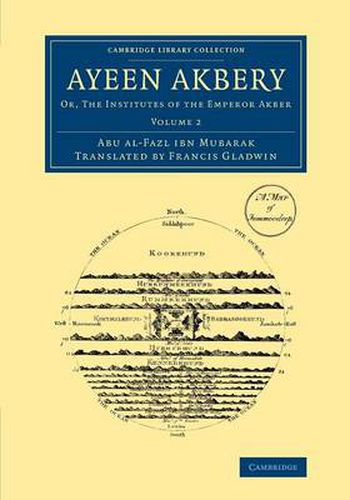Readings Newsletter
Become a Readings Member to make your shopping experience even easier.
Sign in or sign up for free!
You’re not far away from qualifying for FREE standard shipping within Australia
You’ve qualified for FREE standard shipping within Australia
The cart is loading…






Akbar the Great (1542-1605) is often regarded as the Mughal Empire’s most accomplished ruler. This document on the workings of his empire was produced by Akbar’s vizier, Abu'l-Fazl ibn Mubarak (1551-1602). Between 1783 and 1786, the scholar Francis Gladwin (1744/5-1812) produced an English translation from the original Persian. Reissued here is the two-volume edition that appeared in 1800. As the work’s dedicatee and Governor-General of Bengal, Warren Hastings had seen the translation as illuminating the Mughal Empire’s ‘original constitution’ and believed it would educate and inform Britain’s colonial administrators. Gladwin’s text would not be superseded for many decades, and it testifies to the quality of his scholarship and the contemporary concerns of the East India Company. Volume 2 explores religion, science and philosophy, including details of proper dress, forbidden foods, festivals, and India’s flora and fauna.
$9.00 standard shipping within Australia
FREE standard shipping within Australia for orders over $100.00
Express & International shipping calculated at checkout
Akbar the Great (1542-1605) is often regarded as the Mughal Empire’s most accomplished ruler. This document on the workings of his empire was produced by Akbar’s vizier, Abu'l-Fazl ibn Mubarak (1551-1602). Between 1783 and 1786, the scholar Francis Gladwin (1744/5-1812) produced an English translation from the original Persian. Reissued here is the two-volume edition that appeared in 1800. As the work’s dedicatee and Governor-General of Bengal, Warren Hastings had seen the translation as illuminating the Mughal Empire’s ‘original constitution’ and believed it would educate and inform Britain’s colonial administrators. Gladwin’s text would not be superseded for many decades, and it testifies to the quality of his scholarship and the contemporary concerns of the East India Company. Volume 2 explores religion, science and philosophy, including details of proper dress, forbidden foods, festivals, and India’s flora and fauna.